Donald Trump has been called a setback for many things. America. The global community. The environment. Civil service. Civil society. Civility. Civilization. The list goes on.
One might think he has at least been useful to his own cause. That he could at least claim to have benefited the ideas of populism, nationalism, immigration control, and protectionism. That if anything could avoid being devastated by Trump, it would be Trumpism.
But here are some polls from the past few years. They’re all on slightly different things, but I think together they tell an interesting story:
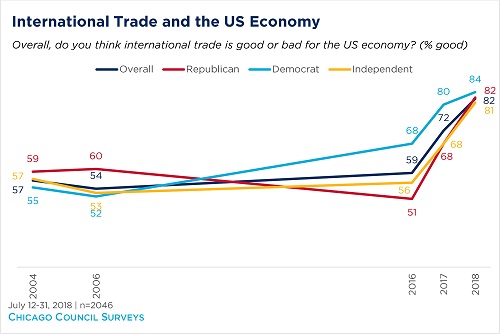
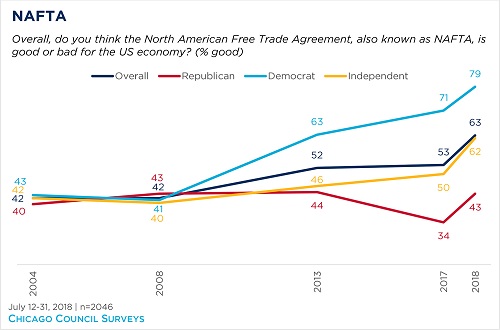
Support for global free trade mysteriously spiked around 2016.
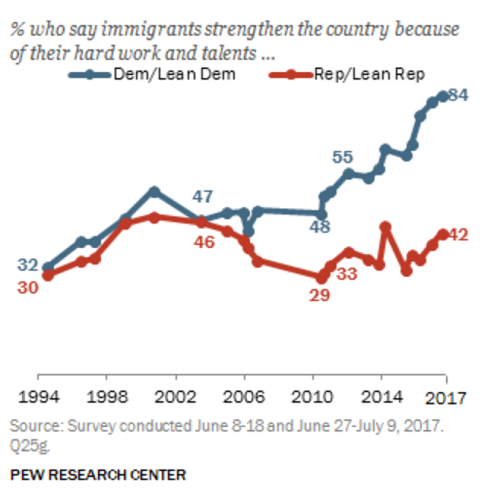
So did moral support for immigrants.
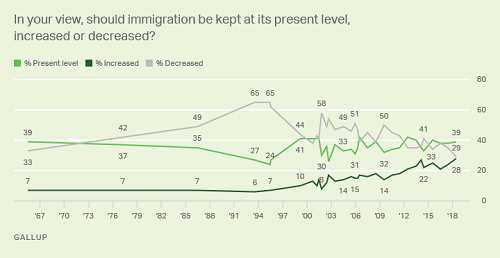
…and, less clearly but still there, support for increasing the number of immigrants (though see here for an apparently contrary source).
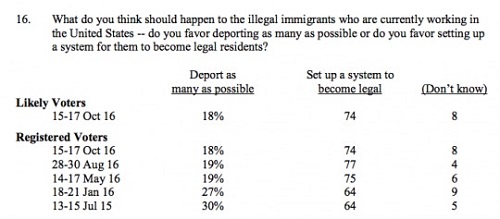
…and opposition to deporting illegal immigrants.
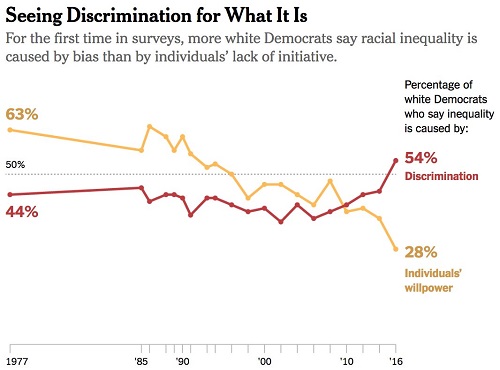
So did belief in racial discrimination as a major cause of inequality, according to this chart with a completely unbiased title which is willing to let readers decide how to think about this issue for themselves.
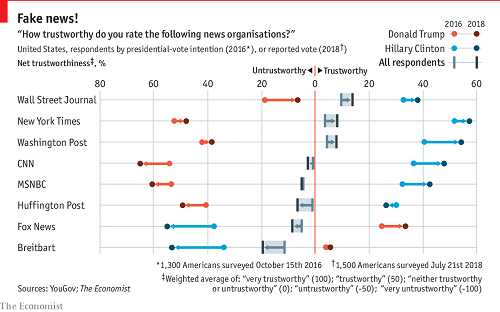
And so did trust in the New York Times and other mainstream media sources.
The clearest example I can find of this effect doesn’t come from the US at all. It’s Minkus, Deutschmann & Delhey (2018). They find that a large European poll asked the same question about support for the EU the week before and after Trump’s election. Just after the election, there was a giant spike in support for the EU, “considerable in size, roughly equivalent to three years of education”. They conclude that:
The election of Trump as a right-wing nationalist with a declared aversion to supranational institutions including the EU — did not trigger a domino effect in the same direction in Europe. To the contrary, a rally effect occurred, in which Europe moved closer together, rallying around the EU’s “flag.” This indicates that an event that may at first sight appear to be a global victory for nationalism can immediately trigger measurable sentiments of resistance in another part of the world, actually leading to new impetus for supranationalism.
This kind of analysis is inherently vulnerable to cherry-picking, and I admit I’ve chosen some especially dramatic results. And polls naturally have a lot of variability, and none of these on their own constitute proof of anything. But I think when you put everything together you do get a trend. Some things have stayed the same, or are inconclusive. But there do seem to be a lot of cases where support for Trumpist positions show a sudden and lasting decrease as soon as Trump enters the national stage.
I want credit for predicting this. In my endorsement of anyone except Trump, I told progressives not to vote Trump because they opposed his policy, and conservatives not to vote Trump because he would cause a backlash that was worse than anything they might get from him. I said that the left thrives by imagining themselves as brave rebels fighting an ignorant, regressive, hateful authority, and that “bringing their straw man to life and putting him in the Oval Office” would be “the biggest gift” they could give the Democrats, and would end up pushing an entire generation further to the left.
I think this is a good broad theory of what’s happening, but it might be worth digging deeper to try to distinguish possible mechanisms.
First, maybe Trump is just such an offensive and aversive figure that people switch sides in disgust. This is a little weird; if you were anti-immigration before Trump, can’t you just say “I hate Trump, but I’m still against immigration”? But maybe people’s minds don’t work that way.
Second, maybe Trump made causes like protectionism and nativism so central to the Republican narrative that they became untenable for Democrats. That is, in 2010, it might have been possible to be an anti-illegal-immigration Democrat (remember, in the early 2000s Hillary supported a border fence), but in 2018, that would signal being a Republican, or at least someone of questionable loyalty to the Democratic Party. In order to fit in, moderate Democrats abandoned their anti-illegal-immigration stances. The graphs above seem to provide some evidence for this: they usually show the largest shift among Democrats, with Republicans merely staying where they are.
Third, and kind of opposite that, maybe Trump is such an offensive and aversive figure that conservatives feel a need to maintain their reputation by distancing themselves from him. Maybe in 2010, being anti-illegal-immigration signaled things that you wanted to signal, like patriotism and support for low-paid workers. And now, being anti-immigration signals things you don’t want to signal, like Trump’s particular brand of inflammatory divisiveness. This doesn’t fit the evidence from the graphs above, but it does sort of fit the European study, where further-right Europeans were more likely to switch opinions after the election than further-left ones.
Fourth, maybe Trump’s focus on certain causes shifted the focus of Democrats and the mainstream media to those causes, and Democrats and the mainstream media were better at opposing them than Trump was at supporting them. For example, since Trump the media has been focusing more intensely on negative aspects of ICE and Border Control practices which were less well-covered before his presidency. If this focus has successfully changed minds, that would explain a shift away from Trump.
Fifth, maybe Trump has shifted the goalposts. Maybe identifying as anti-illegal-immigrant before Trump just meant you thought there should be a little better border control, but now you think it means you want a wall and mass deportations, plus you think all Mexicans are rapists. If you felt like the anti-illegal-immigrant cause was getting more extreme, but your positions stayed the same, then you might stop identifying as anti-illegal-immigrant.
Sixth, there have been a lot of studies showing that peaceful protests may increase support for a cause, but violent or disruptive protests usually decrease it (1, 2, 3). It’s easy enough to analogize Trump to a “disruptive protest” – in the sense of an ideological cause getting associated with an unsympathetic proponent – and this would be compatible with any of the explanations above. But I notice that most of the research in this area was done on whites reacting to civil rights protests, adding an identity dimension: maybe disruptive racially charged protests by blacks increase the salience of race as a category for whites, causing them to shift their opinions more towards ones based on their race rather than based on other values. This would also explain the paradoxical Ferguson effect mentioned in Part III here. In the same way, we can think of Trump’s election as a disruptive Republican move that makes Democrats feel threatened and increases the salience of partisanship for them. This would cause a sort of unilateral polarization, where Democrats become more progressive but Republicans don’t necessarily become more conservative, and so the country as a whole shifts to the left. Like the second explanation, this is compatible with the party breakdown on the graphs above. It’s also compatible with this:
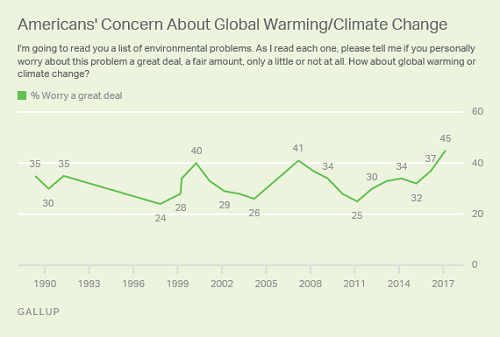
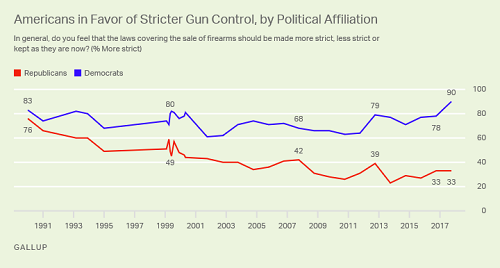
These show the familiar 2016 spike. But although Trump has taken positions against fighting climate change or regulating guns, I don’t think of these two issues as “Trumpist” in the same way as illegal immigration, and I’m surprised they seem to show a Trump-related change. This would make more sense if Trump caused a wider-reaching closing of ranks among Democrats rather than just a shift away from his personal hobbyhorses.
I think all of this should increase people’s concern about backlash effects. Contrary to what some of my conflict theorist friends seem to think, civility and honesty are not always pointless own-goals in politics. If you’re sufficiently repulsive and offensive, you can also end up damaging your own cause.
As I’ve pointed out before, backlash can sometimes be a necessary trade-off to energize your base. But as I’ve also pointed out before, people tend to overestimate the importance of turning out the base, and to underestimate the importance of not having everyone hate you. So if I were a Trumpist, I would be very worried right now.
















